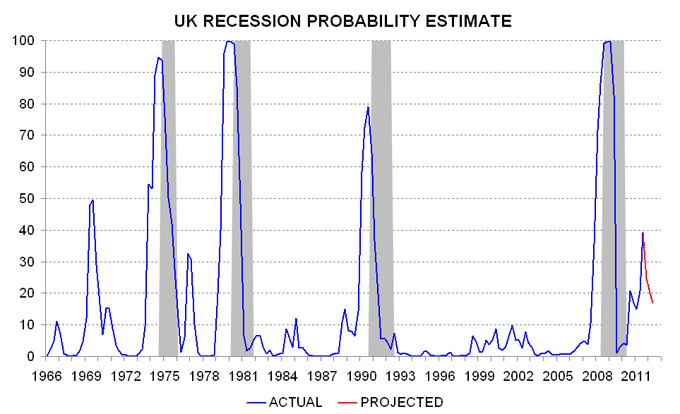Will the UK "double dip"?
Markets remain fearful that the global and UK economies are entering a “double dip”. As discussed in several recent posts, a global recession would be unusual – possibly unprecedented – against the backdrop of recent strength in G7 real narrow money expansion. This strength, however, has been driven by the US and to a lesser extent Japan. Monetary trends remain weak in the Eurozone, where survey indicators are now in recessionary territory – see yesterday’s post.
Will the UK be dragged down by Eurozone contraction? As described below, a monetary forecasting model employed over many years indicates that the probability of a UK recession has risen sharply in recent months but remains below the 50% “trigger” level. On defensible assumptions about the inputs – including, critically, stable global financial conditions – the model predicts that the economy will regain momentum later in 2012.
First estimated in the 1990s, the model is designed to assess the probability of a recession three quarters in advance based on current and lagged values of a range of monetary and financial indicators including short-term interest rates, real narrow and broad money supply measures, the effective exchange rate, credit spreads and share prices*. The chart shows the in-sample performance of the model over the last 50 years. The probability estimate rose well above 50% before the four recessions over this period – 1974-75, 1979-81, 1990-91 and 2008-09.
The recent increase in recession probability started in mid 2010 and was driven initially by a waning of prior interest rate stimulus and slower real money supply expansion, partly due to rising inflation. The pick-up has accelerated over the summer as a result of financial market weakness, reflected in wider credit spreads and lower share prices. Based on the latest input data, the model indicates that a recession is 39% likely by mid 2012.
The model’s forecasting horizon can be extended beyond three quarters by making assumptions about the inputs. An important prospective development is a large decline in inflation in 2012 (albeit by less than projected by the Bank of England), implying a boost to real monetary expansion. Assuming that RPIX inflation subsides to 3.5% while nominal money growth and the other inputs remain at current levels, the recession probability estimate falls back to 25% by mid 2012, consistent with a revival of economic momentum during the second half of next year.
The suggested reacceleration casts doubt on the necessity of “QE2” but this will act as a further stimulus later next year, although at an inflationary cost in 2013-14. Assuming that gilt purchases are limited to £75 billion and serve to boost annual money growth by 2 percentage points, the recession probability estimate declines further to 17% in mid 2012. (£75 billion is equivalent to 4.9% of the M4ex broad money supply measure so a 2 percentage point impact may be conservative, implying “leakage” of nearly three-fifths.)
The recent spike in the estimate will reverse faster if financial markets continue to recover from their summer weakness – possible given the benign global liquidity backdrop but dependent on Eurozone stabilisation. Significant market deterioration would be necessary to push the estimate above 50%, assuming no change in the other inputs – for example, credit spreads would need to double their widening since mid 2011 with equities falling by 10% from current levels.
*A recession is defined here as an annual fall in GDP. This is more stringent than the widely-used “two consecutive quarterly declines” definition, i.e. the probability of a recession in the latter sense will be slightly higher than the model estimate.

Reader Comments